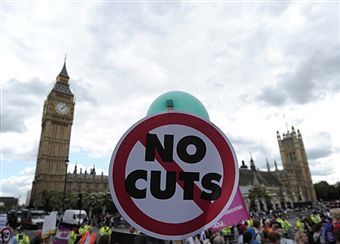 Another testing day for the government, as we shift from the autumn statement to a
national strike. It will certainly be more noticeable than the industrial action in June. Some 2 million public sector workers will be involved. According to the schools minister Nick Gibb, around
75 per cent of state schools will be closed. And on top of that, airport queues will lengthen; non-emergency operations will be cancelled; and today’s parliamentary proceedings will go untranscribed.
Another testing day for the government, as we shift from the autumn statement to a
national strike. It will certainly be more noticeable than the industrial action in June. Some 2 million public sector workers will be involved. According to the schools minister Nick Gibb, around
75 per cent of state schools will be closed. And on top of that, airport queues will lengthen; non-emergency operations will be cancelled; and today’s parliamentary proceedings will go untranscribed.
The government’s attitude towards the unions — or, rather, union bosses — appears to have been hardening. The brothers will not have liked yesterday’s forecast that 710,000 jobs will be shed from the public sector by 2017. And they will not have liked George Osborne’s rhetoric either. ‘I would once again ask the unions why they are damaging our economy at a time like this — and putting jobs at risk,’ he urged. ‘Call off the strikes tomorrow, come back to the table, complete the negotiations — and let’s agree generous pensions that are affordable to the taxpayer.”
Can a relatively painless solution be found after today? It’s not looking hopeful. The unions want more; the coalition doesn’t want to give more. Another round of protracted negotiations might be able to deliver a few new concessions either way — but the union bosses, like Dave Prentis, insist that the government isn’t actually up for those negotiations. Whatever the truth, it all seems to be reducing to the question that James posed the other day: whether the government ‘can simply impose a deal without the unions responding with a prolonged strike.’
One other thing to watch out for today is how successfully Ed Miliband balances support for public sector workers with condemnation of today’s disruption, particularly during PMQs. As Paul Waugh blogs, it’s expected that Labour MPs will cross the picket lines into Parliament. But their leader’s neither-for-nor-against stance could make for some very awkward choreography.






Comments